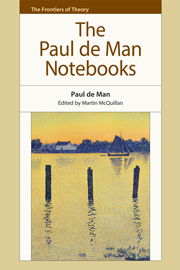Book contents
- Frontmatter
- Contents
- Series Editor's Preface
- Acknowledgements
- Dedication
- Introduction: ‘The Unimaginable Touch of Time’: The Public and Private in the Notebooks of Paul de Man
- PART I Texts
- 1 The Drawings of Paul Valéry (1948)
- 2 Jacques Villon (1952)
- 3 Graduate Essay on Keats (1954)
- 4 Postdoctoral Essay on Symbolism (c. 1960)
- 5 Introduction to Madame Bovary (1965)
- 6 Introduction to The Portable Rousseau (1973)
- 7 On Reading Rousseau (1977)
- 8 Translator's Introduction to “Rousseau and English Romanticism” (1978)
- 9 Rousseau and English Romanticism (1978)
- 10 Introduction to Studies in Romanticism (1979)
- 11 Hommage à Georges Poulet (1982)
- 12 A Letter from Paul de Man (1982)
- 13 Reply to Raymond Geuss (1983)
- 14 Interview with Robert Moynihan (1984)
- PART II Translations
- PART III Teaching
- PART IV Research
- Appendix. The Notebooks of Paul de Man 1963–83
- Bibliography
- Index of Names
11 - Hommage à Georges Poulet (1982)
from PART I - Texts
Published online by Cambridge University Press: 05 December 2014
- Frontmatter
- Contents
- Series Editor's Preface
- Acknowledgements
- Dedication
- Introduction: ‘The Unimaginable Touch of Time’: The Public and Private in the Notebooks of Paul de Man
- PART I Texts
- 1 The Drawings of Paul Valéry (1948)
- 2 Jacques Villon (1952)
- 3 Graduate Essay on Keats (1954)
- 4 Postdoctoral Essay on Symbolism (c. 1960)
- 5 Introduction to Madame Bovary (1965)
- 6 Introduction to The Portable Rousseau (1973)
- 7 On Reading Rousseau (1977)
- 8 Translator's Introduction to “Rousseau and English Romanticism” (1978)
- 9 Rousseau and English Romanticism (1978)
- 10 Introduction to Studies in Romanticism (1979)
- 11 Hommage à Georges Poulet (1982)
- 12 A Letter from Paul de Man (1982)
- 13 Reply to Raymond Geuss (1983)
- 14 Interview with Robert Moynihan (1984)
- PART II Translations
- PART III Teaching
- PART IV Research
- Appendix. The Notebooks of Paul de Man 1963–83
- Bibliography
- Index of Names
Summary
The first essay by Georges Poulet I ever read was in an ephemeral avant-garde review, Sang Nouveau, published some years earlier in the 1930s at Charleroi. The piece was signed with a pseudonym, “Georges Thialet,” and dealt with what now appears a somewhat odd grouping of four contemporary English novelists: Huxley, Priestley, Lawrence, and Joyce. Never had I heard literature talked about in quite that way, with an inner intensity that went far beyond critical evaluation, historical narration, or formal description – although this description, especially in the case of Huxley and Joyce, was both tantalizing and exact. Later, at the beginning of the 1950s, I read an essay on Igitur, published in Deucalion and signed with the author's real name, coincident with the appearance of the Paris edition of the first volume of Studies in Human Time. I read them with the same sense of discovery, despite the considerable amount of innovation that had occurred in the meantime in French criticism. There was something about Poulet's work that made it stand apart and speak with a timeless authority, very different from the timely innovation one admired in others, such as Bataille, Blanchot, Sartre, and Bachelard. Nowadays, after thirty more years of critical dialectics, the same holds true. Re-reading Poulet on one of the many authors that are close to him – Pascal, say, or Constant, or Proust (and there are many others) – one is overcome and enlightened in a manner that reaches well beyond methodological or technical preoccupations.
- Type
- Chapter
- Information
- The Paul de Man Notebooks , pp. 131 - 133Publisher: Edinburgh University PressPrint publication year: 2014

